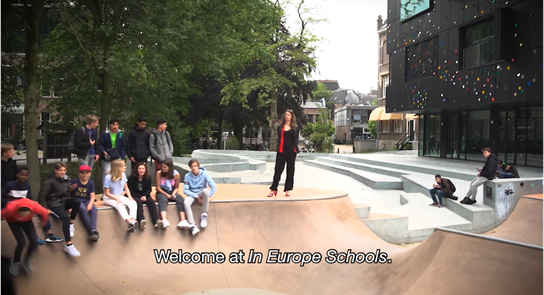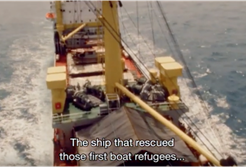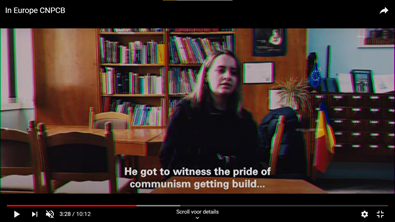In 2019, EuroClio joined forces with Dutch public broadcaster VPRO for the development of an online exchange project for European schools – In Europe Schools. Inspired by the VPRO television series In Europe – History Caught in the Act on modern European history, EuroCio and VPRO, alongside a team of authors, created four Education Kits on Difficult History, Migration, Climate Change and Gender Equality. Part of the online exchange programme are documentaries made by students on their local histories, which they share and discuss with their peers from the partner schools. Students engage in research on their local histories and are supported by various Tutorials on Filming, Editing, Research, and Interviewing, in which the makers of In Europe – History Caught in the Act share their tips and tricks for making good documentaries.
Following a piloting phase in Spring this year, nearly 100 schools have just started a new round of In Europe Schools. EuroClio has taken a moment to reflect on the project with two teachers who successfully completed the piloting phase and are currently participating in the new round. and Anila Beshaj from Albania and Cristina Gila from Romania took a moment to share their experiences with the project.
What prompted your participation in the project?
For Anila, who worked on the topic of Migration, the making of the documentary was a specifically appealing aspect of the exchange project . Cristina, who worked on Difficult History, found out about the project during the 2019 EuroClio Annual Conference held in Gdansk, where In Europe Schools was presented. The collaborative aspect of documentary making and the exchange of ideas was of particular interest to Cristina.
Anila: The idea of making a short documentary was rather captivating. It was also instructive as the students (and I together with them) had to go through different phases (research on the subject, creation of some kind of script, carry out the filming), which was at the same time challenging, but also very interesting from the student/teacher point of view.
Cristina: I found the idea of involving students in a collaborative European project interesting. Young people exchange ideas, document themselves and carry out their own research. Also, the fact that the students assume different roles: interviewer, director, cameraman, to create a documentary seemed a challenge to me. We felt that learning through the project in history classes has a strong impact on the future training for the lives of young people.
How did your students experience documentary-making as a part of their history classes?
Anila: The making of the documentary was an interesting experience for the students. They had to combine socio-historical research and art which, in itself, was a new thing to them. They were very involved at a personal level and tried to find and use personal connections that might be of help in the making of the documentary. They were delighted when they saw the final product of their work.
Cristina: The project started in January 2020, so we had time to go through the materials, analyze and decide on the documentaries that we will make. By March, one of our documentaries was already finished. The students experienced documentary making by collaborating in different teams and working together on creating our final product. The video editors got to learn the different techniques in video editing, while the writers and researchers got to discover the stories of the people they interviewed for the topic. The participation in the project, for some students, was a chance to assert themselves, to come out of anonymity and to prove their personal talent or their passions (film editor, writer). Although they were enthusiastic at first, after some time a part of them withdrew as it took a lot of work and involvement. Those who retired were replaced by other school classmates, curious and attracted by the idea of making a documentary on a historical theme. Involvement in the project, documenting, creating interviews, filming and editing films were moments of learning, but also moments of relaxation for students – they appreciated the stimulating and collaborative way of working.
How did you experience the outbreak of Covid-19 and how did this affect the project at your school?
As the piloting phase of the project took place in the beginning of this year, the participating schools faced different challenges related to the global outbreak of Covid-19.
Anila: The Covid-19 experience was a unique one, as for almost everybody worldwide. The physical separation (due to the school closure) made the communication more difficult but they were able to fully use the technology to stay in touch, continue their work and get the final product ready on time. I believe that the difficulties helped, in a sense, making them more organized and attentive towards the challenges.
Cristina: Our school continued its teaching activities online. The second documentary was not fully completed, although it was in progress and the third documentary was never made. The students were not prepared for the activities at a distance, and this affected us all.
How did you experience the contact with your partner school?
Project participants are matched to another school in Europe for the exchange of documentaries. Right from the very beginning of the project, the pairs are introduced to each other and advised to get to know each other (and their students) as soon as possible. After the first introduction, both schools continue working on the project separately, and exchange their documentaries online, following a final moment of contact for reflection: How is the same topic approached from different perspectives? For most schools participating, contacting the partner school remained to be a challenge due to local lockdowns and restrictions.
Anila: I would say that the contact was rather superficial, just a few email exchanges – the pandemic weighed also on this situation.
Cristina: Since the beginning of the project we have cooperated with our Dutch partner, from Zeven Linden College, Linda. Linda created a common space in Google Drive, where we uploaded our students’ materials: their presentations. We conducted a Skype meeting, where our students were able to exchange ideas and opinions with our partners.
What was the most challenging part of the project overall?
Anila: All the phases had their own difficulties. Of course, the film-making was a novelty for them and it took an important part of the preparation time. The research was, also, I would not say challenging but time consuming as they looked at a lot of materials and talked to different people in order to get a clear picture of the facts dealing with the documentary subject.
Cristina: The most challenging part of the project was the lack of equipment (as in good cameras, different lights and semi-professional software) that could’ve made the workflow so much easier. Our experience last year was really fun. We got to experience video editing and filmmaking for the first time, all while learning about our past.
Student Perspectives
Two of Cristina’s students were happy to share their own experience working on the project. Octavian (17 years old), worked together with his classmates on the history of Communism in the Romanian context and interviewed his grandparents. For Rares (15 years old), the project contributed to his personal development as he very enjoyed working together within a team.
Octavian: For me, this project represented a beneficial experience because I had the opportunity to work with some of my classmates. Also, I documented and I learned a lot of interesting things about life and about the priorities people had during Communism. I started my project activity by writing information that my grandparents told me about the Communist period. Moreover, the most important events from that time have happened during their youth. Also, I studied some materials with my teammates and we cooperated with Dutch students. I’m so proud of the effort I put in to achieve the desired goal and I’m glad I took part in this project!
Rares: This project was my first experience working in a strong team that overcame all the difficulties. I realized that I have managed to climb a new level in my personal development. I learned a lot with my fellow classmates, did the interviews and did the subtitles. The refusal of the elderly to answer our questions and to remember a painful history for the majority of the population was a challenge though. However, I am proud that the work done has paid off and our film has been appreciated at the European level.
Understanding History & Media Literacy
The overall aim of In Europe Schools is to contribute to the teaching and learning of modern European history from a transnational perspective, creating an (online) international working and learning environment for both teachers and students. One of the main learning objectives in this regard, focuses on the development of skills related to media literacy. In this case, media literacy is not merely the making of the documentary in terms of filming and editing, but perhaps even more so in doing research and reflecting on each others’ work. Conducting research on their local histories, students make use of different media (mostly on the Internet) and are challenged to critically reflect on the sources they use.
To see how the project has impacted students’ understanding of history and media literacy, the VPRO conducted a survey among the participating schools following the piloting phase. For most students, completing the project has resulted in an increased awareness and understanding of how history and the media framing of history can influence opinions. Even more so, 80% of the students indicated that their own views have been affected by the project and the documentaries they have made. Some of them state that, ‘’I better understand why migrants are fleeing from their home countries’’ or, ‘’I can see now that a lot of parts of European history have never been told (…)’’. The educational materials encouraged students to think about issues like: What makes a source reliable? How does fact-checking work? How does recent (difficult) history impact one’s own views and opinions? What role does the media play in forming views and opinions? In Europe Schools seems to have helped students on their way in exploring such questions and challenges.
Would you like to find out more about the project or participate with your students? Visit the website or the project page and have a look at the In Europe Schools YouTube Channel for all the documentaries, Starter Clips and Tutorials. For questions or more information, please contact us via eugenie@euroclio.eu.















